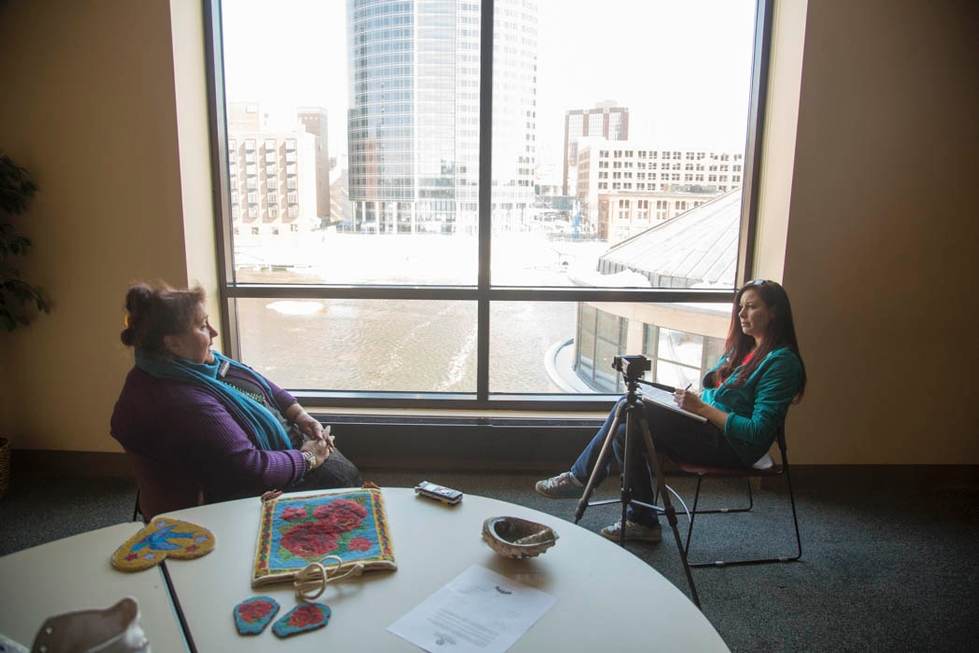Research Spring 2015
Community project will document urban Native history
by Leah Twilley
Throughout West Michigan, Christine Stone is known for her artistic talents and knowledge of area Native American history.
Born in Tuscon, Arizona, in 1951, Stone’s ancestral heritage includes Native American, specifically of the Navajo tribe. She was adopted and grew up in Grand Rapids, where she has immersed herself into the Native American community and culture. She has many stories to tell.
Stone shared her stories in February as part of a project led by a group that aims to create the first archival collection of urban Native American experiences in West Michigan. “Gi-gikinomaage-min: Defend Our History, Unlock Your Spirit” is led by the Grand Valley Native American Advisory Board and is partially funded by a planning grant from the Michigan Humanities Council, an affiliate of the National Endowment for the Humanities.

Grand Valley student Lin Bardwell, right, interviews Stone for a Native American oral history project.
Storytelling is a Native American tradition, said Kristie Scanlon, assistant director for the Office of Multicultural Affairs at Grand Valley and member of the project group.
“Stories are passed down from generation to generation, and we’d like to help through this project.” Lin Bardwell, a Grand Valley student and member of the Little Traverse Bay Bands of Odawa Indians, facilitated the one-hour interview with Stone. She asked questions about Stone’s experiences and challenges.
“I remember going back to Arizona during high school and visiting the pueblo my parents built in the desert,” Stone said. While she values her roots in Arizona, she said she feels the most connected to her Native community in Michigan because she’s “a woods and water girl through and through.”
Her bead work is displayed on a judicial tribal court robe and a pair of moccasins at the Grand Rapids Public Museum; she is involved in art initiatives at Grand Rapids Public Schools and she owned an art shop in Rockford. While Stone’s parents are not Native American, she said they fully support her heritage.
“A lot of friends in the Native community taught me about traditions such as storytelling and dancing,” she said. “Jeanette Sinclair, an important woman in the community, first taught me how to do bead work at Grand Valley Indian Lodge in Belmont.”
Melanie Shell-Weiss, director of the Kutsche Office of Local History at Grand Valley, said the project comes from interest in how the Urban Relocation Program of the 20th century impacted generations of Native Americans. The program created one of the largest movements of Native Americans in U.S. history and remains largely undocumented and unexplored.
“The Native experience in Grand Rapids and West Michigan is part of a much bigger story about one of the largest forced movements of people in the world,” said Shell-Weiss. “It’s a story most people don’t know about, so it’s difficult for educators and community members to learn about it. Our goal with this project is to preserve and share history.”
The project kicked off in November with a community history harvest gathering at the Nattawaseppi Huron Band of the Potawatomi Northern Health Center in Grand Rapids. The overall goal is to digitally record 50-60 stories that will be collected and shared online by Grand Valley’s Special Collections and Archives Office.
Bardwell said she hopes this project will also break down some barriers and preconceived notions among the Native American community. “Some people think it’s better to live on a reservation because the community is so close, and others think it’s better to live in an urban area where’s there is more access to resources and cultural activities. That’s not how it always is, so I hope this is a learning experience for some, too,” she said.
The group is seeking individuals who want to share their family’s stories. Individuals interested can contact Shell- Weiss at [email protected].
“It’s a story most people don’t know about, so it’s difficult for educators and community members to learn about it. Our goal with this project is to preserve and share history.” — Melanie Shell-Weiss
Shell-Weiss said the current grant will be used to frame the project, identify individuals willing to share their stories and survey existing resources in West Michigan. The project team will apply for a larger grant this summer to fund the rest of the project.
“Every season we lose more and more elders who hold so much valuable information,” said Bardwell. “Everyone has a story. That’s the message that we want to get out to the area Native American community.”
